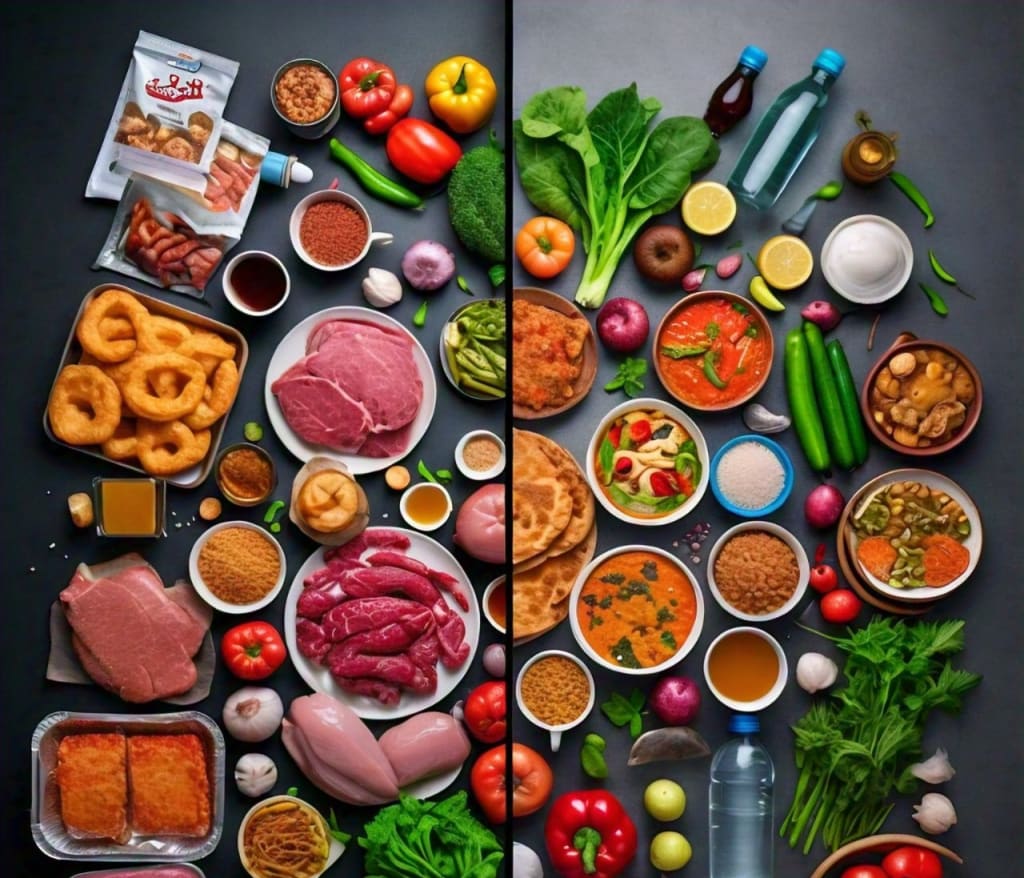Foods That May Increase Your Cancer Risk:
What to Avoid and Why

## Foods That May Increase Your Cancer Risk: What to Avoid and Why
While many factors contribute to cancer, diet plays a significant role. Certain foods can increase the risk of developing cancer, and understanding these can help you make healthier dietary choices. This blog delves into the foods linked to cancer risk, explaining the science behind these connections and offering alternatives for a healthier lifestyle.
### Processed Meats
**Processed meats**, such as bacon, sausages, hot dogs, and deli meats, have been classified as Group 1 carcinogens by the World Health Organization (WHO). This means there is strong evidence that processed meats can cause cancer, particularly colorectal cancer.
**Why are processed meats risky?**
- **Nitrates and Nitrites**: These chemicals, used to preserve processed meats, can convert into carcinogenic compounds in the body.
- **High-Temperature Cooking**: Cooking methods like grilling or frying can produce harmful chemicals called heterocyclic amines (HCAs) and polycyclic aromatic hydrocarbons (PAHs).
**Healthier Alternatives**: Opt for fresh, unprocessed meats, or consider plant-based protein sources like beans, lentils, and tofu.
### Red Meat
Red meats, including beef, pork, and lamb, have been linked to an increased risk of colorectal cancer. The International Agency for Research on Cancer (IARC) classifies red meat as a probable carcinogen (Group 2A).
**Why is red meat risky?**
- **HCAs and PAHs**: Similar to processed meats, cooking red meat at high temperatures can produce HCAs and PAHs.
- **Heme Iron**: The type of iron found in red meat can damage the lining of the colon, potentially leading to cancer.
**Healthier Alternatives**: Choose lean cuts of meat, reduce portion sizes, and incorporate more fish, poultry, and plant-based proteins into your diet.
### Sugary Drinks and Foods
High consumption of sugary drinks and foods is linked to obesity, which is a known risk factor for several types of cancer, including breast, colorectal, and endometrial cancer.
**Why are sugary drinks and foods risky?**
- **Obesity**: Excess body fat can lead to chronic inflammation, hormone imbalances, and insulin resistance, all of which can contribute to cancer development.
- **Blood Sugar Spikes**: High sugar intake can cause rapid spikes in blood sugar and insulin levels, potentially promoting cancer cell growth.
**Healthier Alternatives**: Drink water, herbal teas, or unsweetened beverages. Choose whole fruits instead of sugary snacks and desserts.
### Alcohol
Alcohol consumption is a well-established risk factor for several types of cancer, including breast, liver, mouth, throat, and esophageal cancer. The risk increases with the amount of alcohol consumed.
**Why is alcohol risky?**
- **Acetaldehyde**: When the body processes alcohol, it converts it into acetaldehyde, a toxic chemical that can damage DNA and proteins.
- **Oxidative Stress**: Alcohol metabolism can lead to the production of reactive oxygen species, which cause oxidative stress and damage cells.
**Healthier Alternatives**: Limit alcohol consumption to no more than one drink per day for women and two drinks per day for men. Consider non-alcoholic beverages or mocktails as alternatives.
### Fried and Fast Foods
Fried and fast foods are typically high in unhealthy fats, calories, and additives, which can contribute to cancer risk. These foods are often linked to obesity and other health issues.
**Why are fried and fast foods risky?**
- **Trans Fats**: Found in many fried and fast foods, trans fats can promote inflammation and increase cancer risk.
- **Acrylamide**: A chemical formed during high-temperature cooking of certain foods, acrylamide is classified as a probable human carcinogen.
**Healthier Alternatives**: Prepare meals at home using healthier cooking methods like baking, steaming, or grilling. Choose whole, unprocessed foods over fast food options.
### Salt-Preserved Foods
Foods preserved with salt, such as pickled vegetables and salted fish, are associated with an increased risk of stomach cancer.
**Why are salt-preserved foods risky?**
- **Nitrosamines**: Salt-preserved foods can contain nitrosamines, which are carcinogenic.
- **Stomach Lining Damage**: High salt intake can damage the stomach lining and increase the risk of infection by Helicobacter pylori, a bacteria linked to stomach cancer.
**Healthier Alternatives**: Use fresh or frozen vegetables and fish instead of salted versions. Flavor foods with herbs and spices rather than excessive salt.
### Conclusion
Understanding which foods may increase your cancer risk is an essential step towards a healthier lifestyle. By making informed dietary choices, you can reduce your risk of cancer and improve your overall health. Focus on consuming a balanced diet rich in fruits, vegetables, whole grains, and lean proteins. Remember, moderation is key, and making small changes can have a significant impact on your long-term health.
### Meta Description
Learn about foods that may increase your cancer risk, including processed meats, red meat, sugary drinks, alcohol, fried foods, and salt-preserved foods. Discover healthier alternatives for a balanced diet and reduced cancer risk.
About the Creator
Tresha Kevin
I am Tresha Kevin an experienced content writer from the USA, boasting a decade of expertise in crafting engaging and informative content. With a keen eye for detail and a passion for story telling.
Enjoyed the story? Support the Creator.
Subscribe for free to receive all their stories in your feed. You could also pledge your support or give them a one-off tip, letting them know you appreciate their work.





Comments
There are no comments for this story
Be the first to respond and start the conversation.